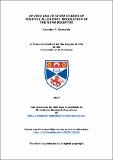In vivo and in vitro studies of positive allosteric modulation of the NMDA receptor
Abstract
Dysfunction of the N-methyl-D-aspartate (NMDA) receptor is thought to contribute to the cognitive deficits of many neurodegenerative diseases and psychiatric disorders. Cognitive symptoms of Alzheimer’s disease can be treated with NMDA receptor antagonists or drugs targeting the cholinergic system; however, there are no effective treatments for cognitive deficits of schizophrenia or Huntington’s disease. With the discovery of a potent and selective allosteric modulator of the NMDA receptor, there is the possibility of new treatments based on NMDA receptor functional-enhancement through neuroactive steroids, closely related in structure to the endogenous neurosteroid, cerebrosterol. The aim of this thesis was to examine steroidal modulation of the NMDA receptor both in vitro and in vivo. In chapter 2, NMDA receptor enhancement of both the synthetic and endogenous neuroactive steroids was assessed in neurons maintained in cell culture using calcium imaging techniques. Sulphation of the steroids greatly increased the efficacy of NMDA receptor enhancement compared to the unsulphated steroids. Chapters 3 and 4 investigate the potential for neuroactive steroids to treat cognitive impairments of Huntington’s disease. Using a mouse model, tests were selected that were analogous to those in which patients are impaired; however, no impairments were found in the mouse model. Chapter 5, therefore, used a different model of cognitive impairment – namely, rats with a set-shifting impairment, as is seen in many psychiatric and neurological disorders, including Huntington’s disease – to assess the effect of the synthetic steroid administration. Unfortunately, the rats did not show the expected impairment. The lack of reliable animal models compromised testing the efficacy of these promising NMDA receptor positive allosteric modulators. Nevertheless, the promising in vitro results suggest that there could still be therapeutic potential. In addition, the compound is a useful research tool for exploring NMDA receptor function in health and disease.
Type
Thesis, PhD Doctor of Philosophy
Collections
Items in the St Andrews Research Repository are protected by copyright, with all rights reserved, unless otherwise indicated.

